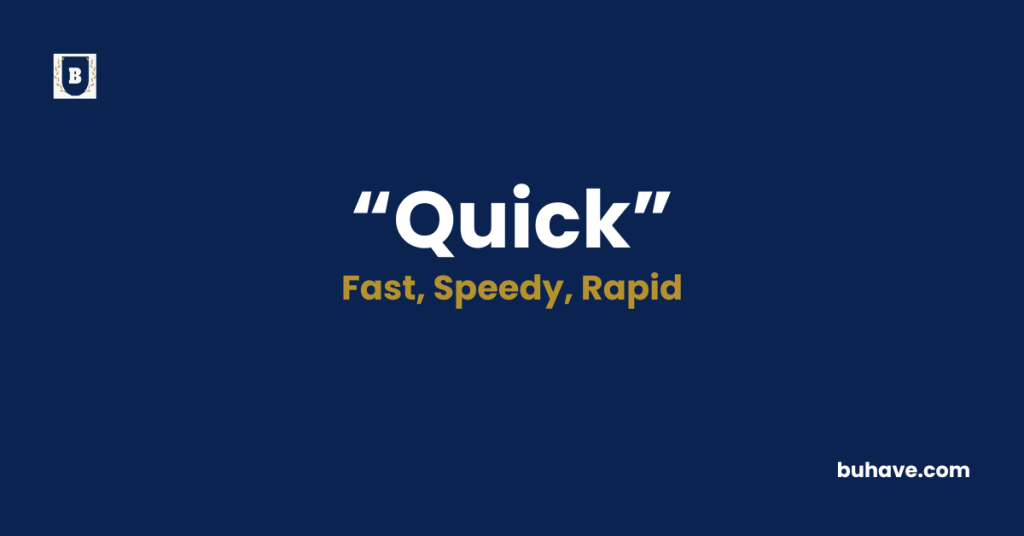The word ‘Quick’ (Adjective) describes something or someone that moves, reacts, or thinks with great speed or efficiency. In this guide, you’ll learn the full definition, synonyms, antonyms, etymology, and real-life examples of how to use ‘Quick’ correctly in sentences.
Quick Explained in Depth
A complete and detailed guide to the words Quick including meaning, definition, examples, etymology, synonyms, and antonyms.
Meanings of Quick
The word quick is commonly used to describe actions or reactions that happen rapidly or within a short time span. When someone is described as quick, it means they are fast in physical movement, thinking, or understanding. For instance, an athlete may have quick reflexes, while a student might have a quick mind. In everyday life, “quick” is used in a wide variety of contexts from food preparation (quick meals) to decision-making (quick thinking) to technology (quick response time).
In essence, “quick” emphasizes efficiency, responsiveness, and reduced delay. It can describe both physical and abstract qualities such as a quick step, a quick glance, or a quick wit. This versatility has made it a staple word in English, valued for its ability to convey urgency, immediacy, or effectiveness. However, while being quick is often seen as a strength, in some situations it may carry a cautionary tone, such as being “too quick to judge,” which suggests acting without full consideration.
Definition
Quick refers to something done with speed or in a short amount of time. It can describe movement, reactions, mental processes, or anything that occurs rapidly. The word is often used to praise someone’s efficiency or promptness, but it can also imply hastiness if not balanced with care or thought.
To be quick is to act or respond with minimal delay. This trait is highly valued in competitive environments like sports, business, or technology, where success often depends on acting faster than others. Quickness is also important in communication, where a quick reply can signal attentiveness and engagement.
Etymology
The word “quick” has deep roots in the English language, tracing back to the Old English word “cwic,” meaning “alive” or “living.” This original sense referred to the presence of life or vitality—hence phrases like “the quick and the dead,” which contrasts living people with those who have passed away.
Over time, the meaning of “quick” evolved to describe the characteristics of life, particularly responsiveness and motion. By the Middle English period, “quick” began to take on the sense of “moving with speed” or “happening rapidly,” a logical shift from describing something full of life to something that acts lively or fast.
This transformation in meaning highlights how early people associated life with movement and responsiveness qualities that remain part of the word’s core definition today.
Example Sentences
- She gave a quick answer that showed she was paying attention.
- The rabbit darted away with quick movements as soon as it sensed danger.
- He is quick to understand even the most complex topics in class.
- They took a quick walk before the rain started pouring.
- A quick glance at the document showed several typos.
Quick Synonyms
- Fast
- Rapid
- Speedy
- Swift
- Prompt
- Immediate
- Brisk
- Snappy
- Expeditious
- Nimble
Quick Antonyms
- Slow
- Delayed
- Sluggish
- Leisurely
- Unhurried
- Gradual
- Languid
- Tardy
- Plodding
- Lazy
FAQs about Quick
Here are some frequently asked questions (FAQs) about the word “Quick”
1. What does “quick” mean?
“Quick” means happening or done in a short time; fast in movement, thought, or action.
2. Can “quick” describe thinking or mental ability?
Yes, someone with a “quick mind” is mentally sharp and able to think or react fast.
3. What’s the difference between “quick” and “fast”?
“Fast” usually refers to physical speed, while “quick” can also refer to mental speed or short time duration.
4. What are some common phrases with “quick”?
Examples include “quick fix,” “quick bite,” “quick look,” and “quick response.”
5. Is “quick” a formal word?
It’s a neutral word and is appropriate in both casual and formal settings.
Explore more Q words
Positive words that start with Q
Negative words that start with Q
Names that start with Q
Nouns that start with Q
Verbs that start with Q

















